 |
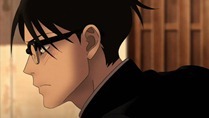 |
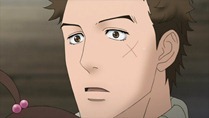 |
And lo, with the simple question “Would you like a persimmon?” was the fujoshi movement born in Kyushu, 1967…
This was a seemingly low-key episode after the frenetic drama of last week, but my sense is of a locomotive bearing relentlessly down on the conclusion suggested by the ED. The effect of Sakamichi is that of looking down on the events of the show from enough distance to see what’s really happening, while the characters themselves are too close and too focused on their own interests. It’s ironic that Kaoru should have used the “can’t see the forest for the trees” metaphor with Sentarou, because it applies just as much to him.
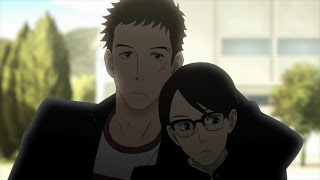 It always seemed most likely, but it was indeed a cruel experience with student politics that caused Brother Jun’s downward spiral. This was the epicenter of counterculture in Japan in the ‘60s – college campuses everywhere were rife with dissent, police were getting violent and kids were being seriously hurt – or worse. Jun seems to have been drawn into the conflict by two friends (one of whom, Arita, is played by Sakurai Takahiro) with the tragic result than one of them – a talented saxophonist – was seriously injured and will never play again. Already in the doghouse with his parents for going to Tokyo in the first place, this touch of radicalism has gotten Jun totally disowned – and he blames himself for his friend’s situation. Throw in some booze and pills, and Skid Row it is.
It always seemed most likely, but it was indeed a cruel experience with student politics that caused Brother Jun’s downward spiral. This was the epicenter of counterculture in Japan in the ‘60s – college campuses everywhere were rife with dissent, police were getting violent and kids were being seriously hurt – or worse. Jun seems to have been drawn into the conflict by two friends (one of whom, Arita, is played by Sakurai Takahiro) with the tragic result than one of them – a talented saxophonist – was seriously injured and will never play again. Already in the doghouse with his parents for going to Tokyo in the first place, this touch of radicalism has gotten Jun totally disowned – and he blames himself for his friend’s situation. Throw in some booze and pills, and Skid Row it is.
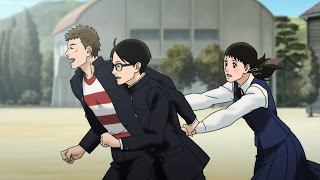 Fortunately Jun-kun has friends like Mukae-san, and ends up physically safe at the very least – after crashing in the studio for a while he finds a cheap room to rent and goes off to suffer in self-important silence. Which he does, until a chance meeting with Yurika changes everything – and she proves herself a pretty strong-willed individual. It was certainly uncomfortable seeing Jun act out forcing himself on her sexually, but I never felt the menace here – just sadness – because it simply never felt like something he’d do. And when she calls his bluff, he relents. And seemingly in doing to takes herself out of the equation for the main trio in the series, leaving them as a conventional dysfunctional love triangle.
Fortunately Jun-kun has friends like Mukae-san, and ends up physically safe at the very least – after crashing in the studio for a while he finds a cheap room to rent and goes off to suffer in self-important silence. Which he does, until a chance meeting with Yurika changes everything – and she proves herself a pretty strong-willed individual. It was certainly uncomfortable seeing Jun act out forcing himself on her sexually, but I never felt the menace here – just sadness – because it simply never felt like something he’d do. And when she calls his bluff, he relents. And seemingly in doing to takes herself out of the equation for the main trio in the series, leaving them as a conventional dysfunctional love triangle.
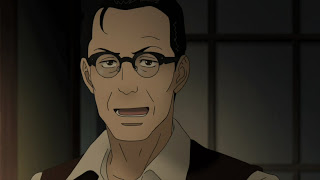 It’ll be interesting to see how those two factor into the rest of the series, as it looks very much to me as if their arc is effectively complete. But for Sen, Bon and Ri-chan it’s just getting more complicated. I’ve said that romance isn’t the main plot here and it isn’t – the most important relationship is still Kaoru and Sentarou. But the two threads are inseparable – and I think we’re about to see what happens when three perfectly good and kind young people who all like each other individually discover just how difficult the heart makes life. As Kaoru is pushing Sentarou to open his eyes and see how Ri-chan feels, she’s finally developing feelings for Kaoru – the one who’s had feelings for her from the moment he laid eyes on her. And sadly for Kaoru, Sentarou seems to have finally seen the light.
It’ll be interesting to see how those two factor into the rest of the series, as it looks very much to me as if their arc is effectively complete. But for Sen, Bon and Ri-chan it’s just getting more complicated. I’ve said that romance isn’t the main plot here and it isn’t – the most important relationship is still Kaoru and Sentarou. But the two threads are inseparable – and I think we’re about to see what happens when three perfectly good and kind young people who all like each other individually discover just how difficult the heart makes life. As Kaoru is pushing Sentarou to open his eyes and see how Ri-chan feels, she’s finally developing feelings for Kaoru – the one who’s had feelings for her from the moment he laid eyes on her. And sadly for Kaoru, Sentarou seems to have finally seen the light.
The irony among these three was dripping off the walls this episode, but never more than when Kaoru saw Ritsuko knitting and assumed it was for Sen. It was exactly the same kind of mistake she made in assuming “Someday My Prince Will Come” was for Yurika – except that while Kaoru disabused Ri-chan of that immediately, this time he ran off before she could tell him how she felt. Kaoru still loves Ri-chan, who’s starting to love him back. Sentarou finally realizes Ri-chan loves him – but is it too late for him? I don’t see how this can possibly end well for Kaoru and Sentarou – either one of them is hurt and blames the other, or both are them are hurt and blame the other. The heart wants what it wants , but not always wisely – Ritsuko’s lament of “I don’t understand myself” could apply to almost everyone at some point in their adolescence. I hate to think of this mutual chain of good intentions tearing apart Sen and Bon’s friendship, but that’s a very real danger.
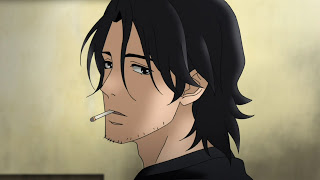 Incidentally, it appears very much to me that Ritsuko’s friend (whose name has not been given that I recall) has a crush on Maruo-kun – which means that the culture festival wasn’t a washout for one of The Olympus, anyway. Perhaps we haven’t heard the last of Seiji, either, who seems to have taken the lesson that he needs to set his sights higher than the school festival. The lack of a real jam session in the basement is always a disappointment, but with the trouble brewing between Kaoru and Sen I’m especially worried that we might not have too many more chances to hear them play…
Incidentally, it appears very much to me that Ritsuko’s friend (whose name has not been given that I recall) has a crush on Maruo-kun – which means that the culture festival wasn’t a washout for one of The Olympus, anyway. Perhaps we haven’t heard the last of Seiji, either, who seems to have taken the lesson that he needs to set his sights higher than the school festival. The lack of a real jam session in the basement is always a disappointment, but with the trouble brewing between Kaoru and Sen I’m especially worried that we might not have too many more chances to hear them play…
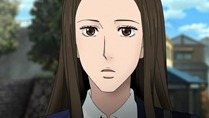 |
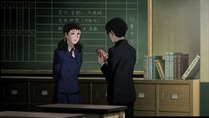 |
 |
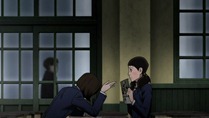 |
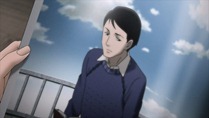 |
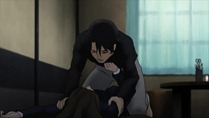 |
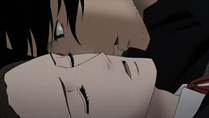 |
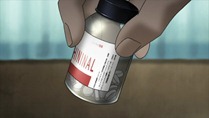 |
 |
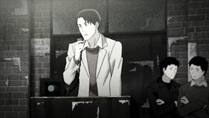 |
 |
 |
 |
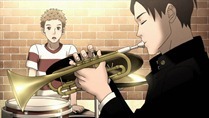 |
 |
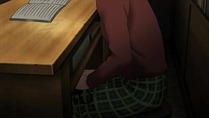 |
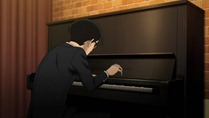 |
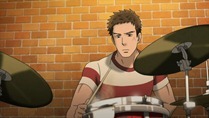 |
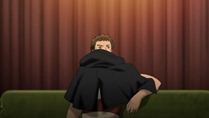 |
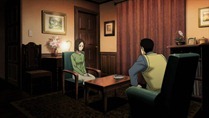 |
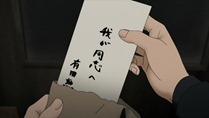 |
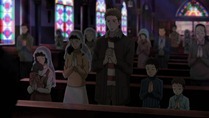 |
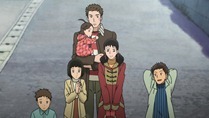 |
 |


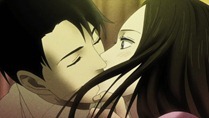
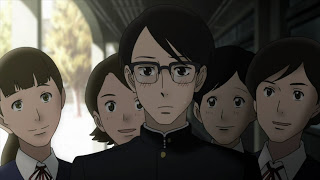
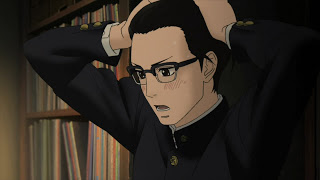

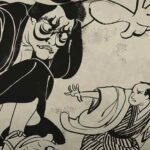
doddle god
June 1, 2012 at 3:15 amtsk tsk tsk…I get tired of saying this, but… (let me get this out of the way first!) as expected, the anime is doing great job of doing a quick summary mix of the manga. In other words, I keep watching this show, but as I'm reading the manga at the same time, it continues to disappoint me. I recommend people to read manga as well or after finishing the anime. Brother Jun is the victim this week who didn't translate well into the anime adaptation. (Sorry GE, I know you might be tired of people complaining about anime being inferior to manga, but I had to write it yet again… it's only because I care~~!)
I'd like to point out that manga's Jun didn't want to participate in the protest movement from the beginning(actually actively avoided it) and almost forced into one after the sax player got into it heavily. That might have contributed his guilt more after his injury, but the anime failed to point that out. After watching this, for all I know, anime's Jun rather happily participated and only got disillusioned after the sax guy's permanent injury. It might be a small difference, but it's glaring change to me.
Anonymous
June 1, 2012 at 6:23 amOne thing that always pisses me off about anime is that whenever there is any portrayal of the 1960s Japanese youth movement the members are always universally depicted as stupid, ignorant, selfish and immoral.
A very recent case in point was this episode, where a student movement veteran who is an irresponsible, unemployed drunkard. There was no equivalent criticism at all of the situation in Japan that led students to rightfully revolt.
It makes me wonder how people in 20-30 years time are going to portray the Occupy Movement or the Indignados movement in art. My guess is that it's going to be no different from the way that modern-day contemporary artists portray the 1970s student movements, namely, that they are drunk, drugged hippies. No mention at all about their serious and legitimate political views.
In this sense, Sakamichi no Apollon became a little bit of a Forrest Gump this episode. A great love story marred by reactionary political views. In much the same way, Forrest Gump also portrayed all the rebels of the 1970s as ignorant and immoral.
Mind you, this episode is the only time so far that Sakamichi no Apollon has delved into political commentary.
This half-assed (read: middlebrow) attempt at being political ruins an otherwise brilliant show about friendship and love. Keep out of politics, Mr. Watanabe: your works suffers when you insert your reactionary politics into them. It doesn't make your shows any "deeper", if that's what you were aiming at.
admin
June 1, 2012 at 6:37 amI would assume that whatever politics are in this, they came from the mangaka and not Watanabe.
I actually didn't find the depiction of the students completely unsympathetic – and I certainly didn't find the depiction of the police especially sympathetic.
Anonymous
June 1, 2012 at 7:04 amthis episode felt too rushed for me. as i'm not familiar with 1960's Japan, i probably wouldn't have understood Jun-nii's situation had i not read the manga before.
Beckett
June 5, 2012 at 4:27 amHmm I'm not so sure that Ritsuko's friend likes Maruo. My initial thoughts on that scene were that she likes Sentaro and was rushing off to grill Maruo for information, since he's basically the only person in the school aside from Ritsuko and Kaoru who has any kind of relationship with Sentaro whatsoever. Maybe I'm wrong but that's what I thought when I saw that.
admin
June 5, 2012 at 4:51 amThat's a notion – could be. I just know it was Maruo walking by. I'm not sure why she'd think he and Sen were especially close, though – you'd think she'd go to Kaoru for information.